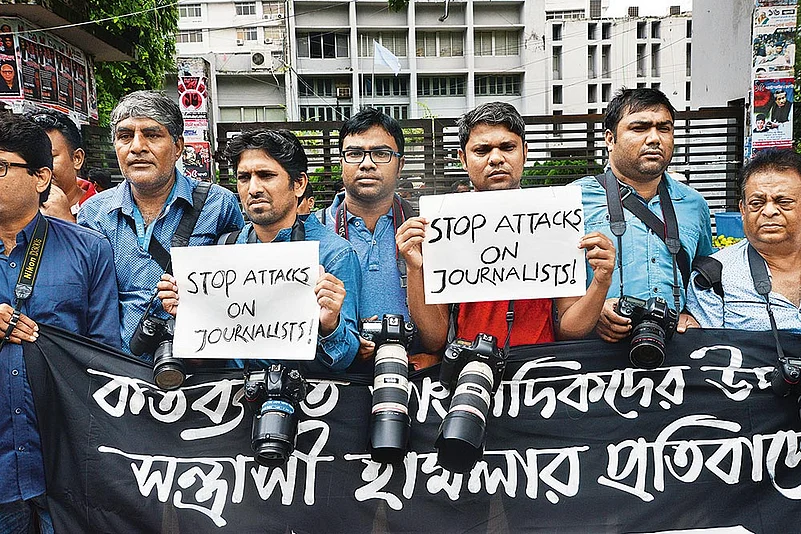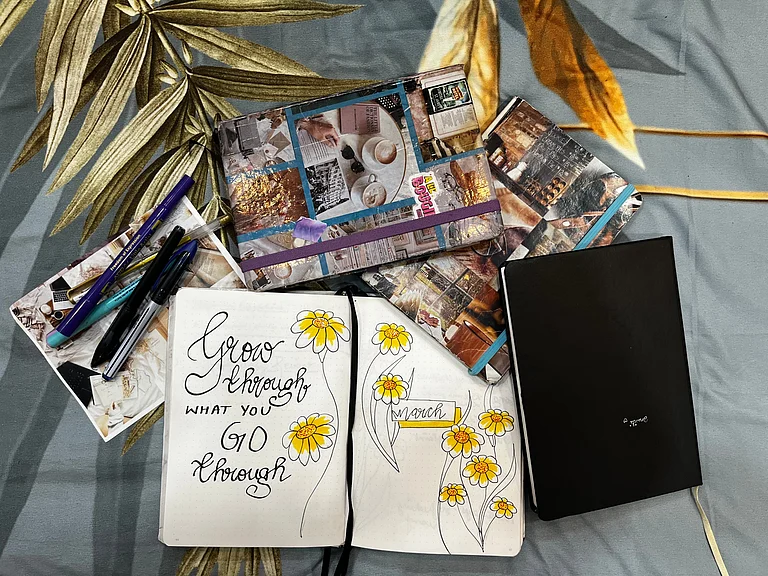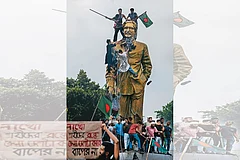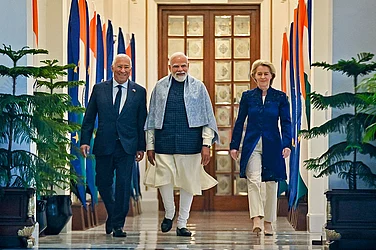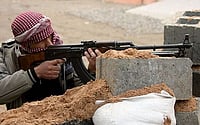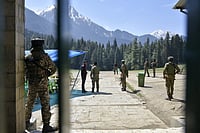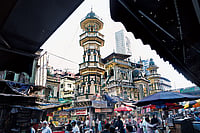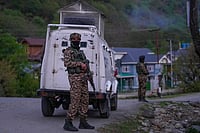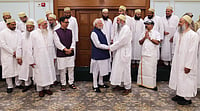It was a dangerous time to be a journalist in Bangladesh. Between 2001 and 2006, 13 journalists were killed and hundreds faced threats, intimidation, harassment and torture from law enforcement agencies. In 2007—at a time when an interim government supported by the military took over—journalist Tasneem Khalil had crossed a ‘redline’. The journalist with The Daily Star had published several reports critical of the military and the police, which not many Bangladeshi journalists wrote about.
On May 10, 2007, he was picked up from his home, blindfolded and reportedly taken to an army camp, where he was tortured. In the following days, Khalil fled Bangladesh and took refuge in Sweden. Over the following decade, Bangladesh’s Press Freedom Index continued on a downward trend. The Digital Security Act (DSA) introduced in 2018—an updated version of the 2006 Information Technology Act—became the most stringent draconian law to muzzle the press. Journalists critical of the ruling Awami League government were brought under DSA charges. A study by the Centre for Governance Studies (CGS) found that 280 journalists were accused of violations, 84 of whom were detained, between October 2018 and August 2022. Against this backdrop, Khalil, while still in exile, set up the Netra News, an independent public interest journalism outlet in Sweden. Netra News’ investigative reportage exposing corruption in the ruling government and abuse of security agencies is a rare feat of journalism.
Outlook’s Senior Editor Shweta Desai spoke to Khalil on running an online news platform from Sweden, tracking political instability and protests in Bangladesh.

How did Netra News start?
When I arrived in Sweden, I was not doing journalism. I worked with think tanks on human rights and pursued academics. In 2018, I saw news videos of protests by young Bangladeshi school students for road safety. Looking back, it seems like a preview of the 2024 student revolution. Those kids grew up and came down on the streets this time. I was encouraged to see their bravery and equally disgusted to see how those protests were quelled. I remember seeing children in school uniform mercilessly beaten up by the ruling party thugs. It was one of the obscene visuals—blood on a school uniform. At that point, I decided to start working again on Bangladesh. The state of journalism and human rights was abysmal. I began discussing with a few friends, and we decided that if we want to bring democracy back, we have to create an independent new platform that will hold the government and the people in power accountable.
You’ve faced many threats and intimidation since the launch of Netra News. Authorities have intimidated your family in Bangladesh and charged you under the DSA. The All European Awami League filed a complaint in Sweden, accusing you of spreading propaganda against the ruling party. But you’ve continued to pursue investigative journalism. Why?
I’ve been called a jihadi agent and even a member of Al-Qaeda by a section of the media. But I am just a journalist. I am also just a face for Netra News. It is my courageous colleagues who are reporting from ground zero. They are not doing the job to get a byline, but for the sake of journalism. Byline is most important for any journalist. But we do not give bylines because of security reasons. We are a small newsroom. We have professional journalists and collaborators (freelancers). We have a graphics person, an art director, an editor and a team of reporters inside Bangladesh, while the other team members are in the US, the UK and Sweden.

What does it take to run a newsroom in exile? How do you operate given the high risks of crackdown and surveillance by Bangladeshi authorities?
We have extremely sophisticated and strict security protocols which we follow to the last dot. This has helped us in two areas: none of our journalists or sources have been exposed so far. Digital security is extremely important for us. There are also protocols for physical ground reporting. We have been under the microscope for quite some time. The Bangladesh intelligence agencies have been trying to figure out who are our ground reporters. There are times when I feel I am running an intel agency (smiles). It’s a very challenging job. I am an editor and not a spy, but sometimes it still feels just that.
One has to be extremely strategic and seize on every opportunity and turn it in your favour. Within 72 hours of our launch in December 2019, the government blocked our website. We had anticipated this and posted a mirror website on Google Cloud Platform. The agencies could not block this. No one knew about our news channel, but people began questioning as to why the government was banning this website. Within days of the launch, we were covered by Al Jazeera. We got free publicity. The government did us a favour by blocking us (smiles).
We make decisions with a calm-headed approach and try to stick to our charter and mission statement. We are here for public service journalism and not for profit. We are solely funded by the National Endowment for Democracy, a US-based NGO that supports freedom and democracy. We don’t have owners to satisfy or pander to the views of political parties. We are fiercely independent, and that’s what has worked for us.
“For a long time, Bangladesh has not been democratic and this is one of the reasons why the government did not allow independent journalists into the country. It was a police state which had secret detention facilities.”
How did Netra News investigate the major expose on Aynaghar—Bangladesh’s secret detention facility?
For a long time, Bangladesh has not been democratic and this is one of the reasons why the government did not allow independent journalists into the country. It was a police state, and police states have secret detention facilities. We could do this story because of extremely brave survivors and whistleblowers—both military and police officers—who have integrity and are highly patriotic. This is one of the most secure facilities, apart from the PM’s residence, in Bangladesh. Yet, the whistleblowers were able to visit the detention facility and take photographs.
The story came to me as a tip-off from a Bangladesh worker in Malaysia. He called me and narrated what had happened to him. I did not believe a word of what he said. It was worse than Abu Ghraib. So I decided to check it out. Everything he said ticked the box. He was an extremely intelligent guy who remembered everything minutely. We interviewed him over many days and began to reconstruct the events from the time he was picked up to the time of his release. We tracked the route to the detention centre. This guy worked as a bus driver, so even when he was blindfolded, he could describe every bump, signal or checkpoint. This kind of information gave us an idea about the location. We made a list of features from his interview like the collapsible gate, the prison bars, medical checkup of detainees and Energy Plus biscuits served for evening snacks, and tried to check with our sources in different agencies if they’d heard of such a facility. And we heard back from two of the whistleblowers who said they might have an idea about this facility.
The government rejected the story as false and said it was propaganda. This story was important to expose the government and how it was keeping people in detention outside the purview of the law. It was a textbook example of crimes against humanity. This secret prison is evidence against Sheikh Hasina, when she stands for trial.
MORE FROM THIS ISSUE
Did you anticipate the 2024 protests?
Like I said before, the protests in 2018 were a precursor to the events in 2024. The students who were on the streets five years ago did not give up, even when they were brutally suppressed. They were very organised. They planned and learned the techniques of civil disobedience. They were prepared. There was massive unrest and resentment against the Hasina government and the way the government was being made a “client state” of the Indian government. There was a whisper for a long time that something was not right in Bangladesh.
Now that there’s a regime change in Bangladesh, do you think there will be freedom for the press and security for news journalism like Netra News?
Nowhere in the world is freedom granted to anyone. It is something people have to earn and gain. Netra News was set up as a part of the struggle to establish press freedom in Bangladesh. We have reached the halfway mark. We can now think about going back to Bangladesh and starting our operations. I personally can’t go back. But our plan is to be more visible. If we can operate freely, even partly from within the country, it will be a huge step forward for press freedom. We have set the agenda for public interest journalism and hopefully, it will be followed by local news organisations as well. I hope the interim government is receptive to that. If not, we will continue our fight.
(This appeared in the print as 'Newsroom In Exile')






